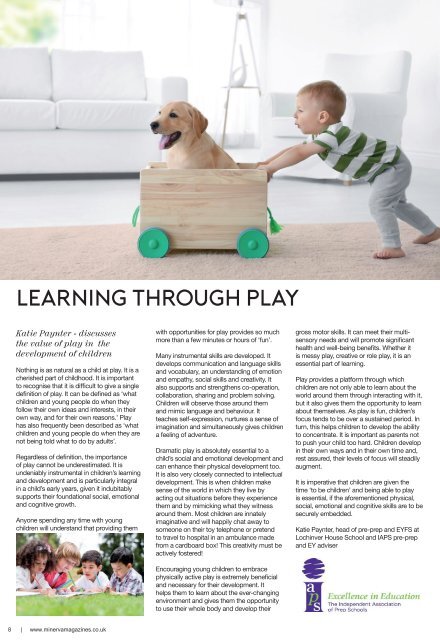Stratford-upon-Avon Living Jul - Aug 2021
The high summer edition is here! And this issue is packed with amazing features, including delicious slow cooker recipes, an unbelievable garden transformation and a competition page brimming with prizes!
The high summer edition is here! And this issue is packed with amazing features, including delicious slow cooker recipes, an unbelievable garden transformation and a competition page brimming with prizes!
You also want an ePaper? Increase the reach of your titles
YUMPU automatically turns print PDFs into web optimized ePapers that Google loves.
Learning through play<br />
Katie Paynter - discusses<br />
the value of play in the<br />
development of children<br />
Nothing is as natural as a child at play. It is a<br />
cherished part of childhood. It is important<br />
to recognise that it is difficult to give a single<br />
definition of play. It can be defined as ‘what<br />
children and young people do when they<br />
follow their own ideas and interests, in their<br />
own way, and for their own reasons.’ Play<br />
has also frequently been described as ‘what<br />
children and young people do when they are<br />
not being told what to do by adults’.<br />
Regardless of definition, the importance<br />
of play cannot be underestimated. It is<br />
undeniably instrumental in children’s learning<br />
and development and is particularly integral<br />
in a child’s early years, given it indubitably<br />
supports their foundational social, emotional<br />
and cognitive growth.<br />
Anyone spending any time with young<br />
children will understand that providing them<br />
with opportunities for play provides so much<br />
more than a few minutes or hours of ‘fun’.<br />
Many instrumental skills are developed. It<br />
develops communication and language skills<br />
and vocabulary, an understanding of emotion<br />
and empathy, social skills and creativity. It<br />
also supports and strengthens co-operation,<br />
collaboration, sharing and problem solving.<br />
Children will observe those around them<br />
and mimic language and behaviour. It<br />
teaches self-expression, nurtures a sense of<br />
imagination and simultaneously gives children<br />
a feeling of adventure.<br />
Dramatic play is absolutely essential to a<br />
child’s social and emotional development and<br />
can enhance their physical development too.<br />
It is also very closely connected to intellectual<br />
development. This is when children make<br />
sense of the world in which they live by<br />
acting out situations before they experience<br />
them and by mimicking what they witness<br />
around them. Most children are innately<br />
imaginative and will happily chat away to<br />
someone on their toy telephone or pretend<br />
to travel to hospital in an ambulance made<br />
from a cardboard box! This creativity must be<br />
actively fostered!<br />
Encouraging young children to embrace<br />
physically active play is extremely beneficial<br />
and necessary for their development. It<br />
helps them to learn about the ever-changing<br />
environment and gives them the opportunity<br />
to use their whole body and develop their<br />
gross motor skills. It can meet their multisensory<br />
needs and will promote significant<br />
health and well-being benefits. Whether it<br />
is messy play, creative or role play, it is an<br />
essential part of learning.<br />
Play provides a platform through which<br />
children are not only able to learn about the<br />
world around them through interacting with it,<br />
but it also gives them the opportunity to learn<br />
about themselves. As play is fun, children’s<br />
focus tends to be over a sustained period. In<br />
turn, this helps children to develop the ability<br />
to concentrate. It is important as parents not<br />
to push your child too hard. Children develop<br />
in their own ways and in their own time and,<br />
rest assured, their levels of focus will steadily<br />
augment.<br />
It is imperative that children are given the<br />
time ‘to be children’ and being able to play<br />
is essential, if the aforementioned physical,<br />
social, emotional and cognitive skills are to be<br />
securely embedded.<br />
Katie Paynter, head of pre-prep and EYFS at<br />
Lochinver House School and IAPS pre-prep<br />
and EY adviser<br />
8 | www.minervamagazines.co.uk


















